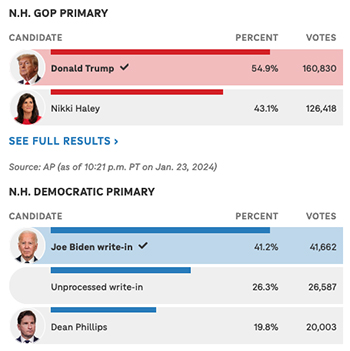By Jim Ellis — Monday, Feb. 19, 2024
Senate
Montana: Rosendale’s Quick Exit — After months of speculation as to whether US Rep. Matt Rosendale (R-Glendive) would enter the Montana US Senate race culminating with his declaration of candidacy on February 9th, we now see a quick end.Late last week, Rosendale announced that he will not file for the Senate, saying in a released statement that he has “been forced to calculate what my chances of success would be with Trump supporting my opponent.” On the day of Rosendale’s Senate announcement, former President Donald Trump issued his endorsement of aerospace company CEO and retired Navy SEAL Tim Sheehy. Rosendale indicated he will take time to ponder his next political step.
Maryland: Hogan Doing Well in New Poll — A release from Emerson College (Feb. 12-13; 1,000 registered Maryland voters; 543 likely Democratic primary voters; 246 likely Republican primary voters; multiple sampling techniques) finds former Gov. Larry Hogan (R) tied with US Rep. David Trone (D-Potomac), who has already spent $23 million in attempting to win the Democratic Party nomination, at 42 percent apiece. He would lead Prince George’s County Executive Angela Alsobrooks, 44-37 percent, if she were to become the Democratic nominee.
What is particularly surprising and may well not hold up once the campaign begins in earnest, is Hogan’s standing among Independent voters and even Democrats. If Trone were his general election opponent, Hogan would lead among Independents and rather stunningly attracts approximately one-quarter of Democratic voters. With Alsobrooks as his opponent, Hogan’s numbers are much better. Within this pairing, he would lead among Independents 43-18 percent, while converting 31 percent of Democratic voters.
House
New York: Redistricting Commission Approves Cong Map — The New York Independent Redistricting Commission, on a vote of 9-1, late last week adopted a new congressional map, but it looks very much like the current court-drawn plan. It appears the commissioners adopted a “least change” model in that the early reported change seems to adversely affect Rep. Brandon Williams (R-Syracuse), at least slightly, but conversely helps adjacent Rep. Marc Molinaro (R-Red Hook). Much more will be known about the map when statisticians delve into the partisan patterns of the new boundaries.
The “independent” commission is not so independent. The legislature must now approve the commission map and it is uncertain whether large Democratic majorities in both houses will accept a “least change” map.
SC-6: Rep. Clyburn Steps Down from Leadership Post — In a written press release, US Rep. Jim Clyburn (D-SC) announced that he will be resigning his leadership position as Assistant to the Minority Leader, Hakeem Jeffries. While stepping down from the Democratic Leadership tree, the 83-year-old veteran House member, who is completing his 16th term in Congress, additionally said that he will seek re-election to his Columbia anchored seat in the South Carolina delegation. News reports suggest that Colorado Rep. Joe Neguse (D-Lafayette/Boulder) is a strong candidate to replace Clyburn as Minority Leader Jeffries’ (D-NY) Assistant.
Governor
Missouri: Ashcroft Continues to Lead — Republican polling firm ARW Strategies conducted a survey of the Missouri GOP electorate (Feb. 5-7; 611 likely Missouri Republican primary voters) and found Secretary of State Jay Ashcroft, son of former US senator and US Attorney General John Ashcroft continuing to lead the open gubernatorial field. According to the ARW results, Ashcroft leads Lt. Gov. Mike Kehoe and state Sen. Bill Eigel (R-Weldon Spring) by a 36-13-13 percent margin. The findings are consistent with other previously conducted polls.
This survey, however, skews male (51.1 percent) and to those 65 years of age and older. This age demographic represents only 16 percent of the Missouri at-large population, but 46 percent in this particular poll. Incumbent Gov. Mike Parson (R) is ineligible to seek a third term.







